| Listing 1 - 10 of 14 | << page >> |
Sort by
|
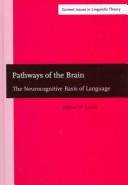
ISSN: 03040763 ISBN: 9027236771 1556198884 9027236755 1556198868 9789027236753 9789027284037 9027284032 9786613158437 6613158437 9781556198861 9781556198885 9789027236753 9789027236777 1283158434 Year: 1999 Volume: 170 Publisher: Amsterdam Philadelphia J. Benjamins
Abstract | Keywords | Export | Availability | Bookmark
 Loading...
Loading...Choose an application
- Reference Manager
- EndNote
- RefWorks (Direct export to RefWorks)
The brain is the organ of knowledge and organizer of our abilities, our means of recognizing a face in a crowd, of conversing about anything we experience or imagine, of forming thoughts and developing ideas, of instantly understanding words coming rapidly in conversation. How does it manage all this? Does it represent information in symbols or in the connectivity of a vast network?Pathways of the Brain builds a theory to answer such questions. Using a top-down modeling strategy, it charts relationships among words and other products of the brain's linguistic system to reveal properties
Psycholinguistics --- Neuropathology --- Biolinguistics --- Neurolinguistics --- Biolinguistique --- Neurolinguistique --- Biolinguïstiek --- Biolinguïstiek. --- Neurolinguïstiek. --- Biolinguistics. --- Biology --- Linguistics
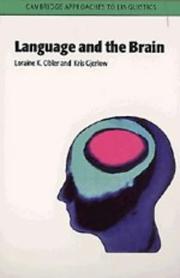
ISBN: 0521466415 9780521466417 Year: 1999 Publisher: Cambridge Cambridge University Press
Abstract | Keywords | Export | Availability | Bookmark
 Loading...
Loading...Choose an application
- Reference Manager
- EndNote
- RefWorks (Direct export to RefWorks)
#KVHB:Biolinguistiek --- #KVHB:Taalstoornissen --- #KVHB:Hersenbeschadiging --- Taalstoornissen --- Hersenen --- Neurologie --- Linguïstiek --- Taalverwerving --- Taalstoornis --- Verpleegkunde

ISBN: 0521007836 0521809940 1107132142 0511178050 0511042108 0511148585 0511305419 0511613865 128041944X 0511044917 9780511042102 9780521809948 9780521007832 9780511148583 9780511044915 9780511613869 9781280419447 9786610419449 6610419442 Year: 2002 Publisher: Cambridge New York Cambridge University Press
Abstract | Keywords | Export | Availability | Bookmark
 Loading...
Loading...Choose an application
- Reference Manager
- EndNote
- RefWorks (Direct export to RefWorks)
The Language Organ treats human language as the manifestation of a faculty of the mind, a mental organ whose nature is determined by human biology and whose functional properties should be explored just as physiology explores the functional properties of physical organs. It surveys the nature of the language faculty in its various aspects: the systems of sounds, words, and syntax, the development of language in the child and historically, and what is known about its relation to the brain. It discusses the kinds of work that can be carried out in these areas that will contribute to an understanding of the human language organ. This book will appeal to students and researchers in linguistics, and is written to be accessible to colleagues in other disciplines dealing with language as well as to readers with an interest in general science and the nature of the human mind.
Biolinguistics. --- Cognition. --- Biolinguistics --- Biolinguistique --- Biolinguïstiek --- Cognitie --- Cognition --- Linguistique [Bio] --- Linguïstiek [Bio] --- Psycholinguistics --- #KVHB:Taal --- #KVHB:Linguistiek --- #KVHB:Fonetiek --- #KVHB:Taalontwikkeling --- Psychology --- Biology --- Linguistics --- Arts and Humanities --- Language & Linguistics

ISBN: 9027225915 1588112268 9027225907 158811225X 9789027225917 9786612160844 1282160842 9027296065 9789027296061 9781588112255 9781588112262 9789027225900 Year: 2002 Publisher: Amsterdam Philadelphia : J. Benjamins Pub. Co.,
Abstract | Keywords | Export | Availability | Bookmark
 Loading...
Loading...Choose an application
- Reference Manager
- EndNote
- RefWorks (Direct export to RefWorks)
Is human language an evolutionary adaptation? Is linguistics a natural science? These questions have bedeviled philosophers, philologists and linguists from Plato through Chomsky. Prof. Givón suggests that the answers fall naturally within an integrated study of living organisms.In this new work, Givón points out that language operates between aspects of both complex biological design and adaptive behavior. As in biology, the whole is an adaptive compromise to competing demands. Variation is the indispensable tool of learning, change and adaptation. The contrast between innateness and input-driven emergence is an interaction between genetically-coded and behaviorally-coded experience.In enlarging the cross-disciplinary domain, the book examines the parallels between language evolution and language diachrony. Sociality, cooperation and communication are shown to be rooted in a common evolutionary source, the kin-based hunting-and-gathering society of intimates.The book pays homage to the late Joseph Greenberg and his visionary integration of functional motivation, typological diversity and diachronic change.
Psycholinguistics --- Biolinguïstiek. --- Taal --- oorsprong. --- Biolinguistics --- Biolinguistique --- Biolinguïstiek --- Linguistique [Bio] --- Linguïstiek [Bio] --- Biolinguistics. --- LANGUAGE ARTS & DISCIPLINES --- Linguistics / General --- Linguistics --- Language --- Communication --- Information Science --- Philology & Linguistics --- Languages & Literatures --- Information Sciences --- Science, Information --- Sciences, Information --- Communication Programs --- Communications Personnel --- Misinformation --- Personal Communication --- Social Communication --- Communication Program --- Communication, Personal --- Communication, Social --- Communications, Social --- Personnel, Communications --- Program, Communication --- Programs, Communication --- Social Communications --- Dialect --- Dialects --- Languages --- Linguistic --- Biology
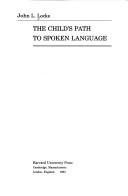
ISBN: 0674116402 Year: 1993 Publisher: Cambridge, Mass. Harvard University Press
Abstract | Keywords | Export | Availability | Bookmark
 Loading...
Loading...Choose an application
- Reference Manager
- EndNote
- RefWorks (Direct export to RefWorks)
Psycholinguistics --- Sociolinguistics --- Acquisition du langage --- Acquisition of language --- Biolinguistics --- Biolinguistique --- Biolinguïstiek --- Langage [Acquisition du ] --- Language acquisition --- Language development in children --- Linguistique [Bio] --- Linguïstiek [Bio] --- Taalverwerving --- Langage --- Acquisition --- Biolinguistics. --- Language acquisition.
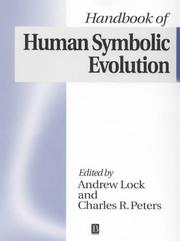
ISBN: 0198521537 0631216901 Year: 1996 Publisher: Oxford : Clarendon Press,
Abstract | Keywords | Export | Availability | Bookmark
 Loading...
Loading...Choose an application
- Reference Manager
- EndNote
- RefWorks (Direct export to RefWorks)
Biolinguistics --- Psycholinguistics --- Symbolism (Psychology) --- Symbolism --- Biolinguistique --- Psycholinguistique --- Symbolisme (Psychologie) --- Symbolisme --- History --- Histoire --- Biolinguistics. --- Psycholinguistics. --- History. --- Symbolism (Psychology). --- Biolinguïstiek --- Linguistique [Bio] --- Linguïstiek [Bio] --- Symboliek (Psychologie) --- Cognitive psychology --- Ethnology. Cultural anthropology
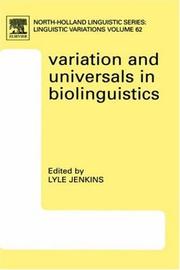
ISBN: 0444512314 9786610967193 1280967196 0080474748 9780444512314 Year: 2004 Volume: 62 Publisher: Amsterdam : Elsevier,
Abstract | Keywords | Export | Availability | Bookmark
 Loading...
Loading...Choose an application
- Reference Manager
- EndNote
- RefWorks (Direct export to RefWorks)
"Jenkins has succeeded in putting together a terrific volume. Some of the most creative minds in the fields tackle questions of utmost importance in biolinguistics. The clarity with which these essays are written and the insights expressed in them are sure to provide solid foundations for research in linguistics and related fields for years to come. A truly outstanding collection!" - Cedric Boeckx, Harvard University, USA This book provides a current and interdisciplinary overview of work on the biology of language - what is sometimes called the "biolinguistic approach." A wide range of areas are investigated and reviewed by specialists: the micro-parametric theory of syntax, models of language acquisition and historical change, dynamical systems in language, genetics of populations, pragmatics of discourse, language neurology, genetic disorders of language, sign language, and evolution of language. It focuses on the interplay between variation and the universal properties of language. Detailed surveys or case studies are provided from the areas of syntactic variation, genetic variation, neurological variation and historical variation, among others, and of the universal principles and theoretical models that underlie the variation. Finally, it considers-in addition to the detailed empirical studies-philosophical, foundational and methodological issues in the study of the biology of language and its place within the natural sciences; e.g., innateness, modularity, language design and unification in biolinguistics, as well as critiques of the approach.
Biolinguistics --- Language and languages --- Variation --- Biolinguistique --- Biolinguïstiek --- Linguistique [Bio] --- Linguïstiek [Bio] --- Language and languages - Variation --- Biolinguistics. --- Characterology of speech --- Language diversity --- Language subsystems --- Language variation --- Linguistic diversity --- Variation in language --- Biology --- Linguistics --- Variation.
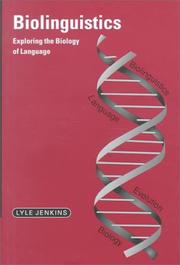
ISBN: 0521652332 0521003911 1107117364 0511009941 0511172354 0511150830 0511324731 0511605765 1280432527 0511048211 9780511009945 0511032986 9780511032981 9780511605765 9781280432521 9780511150838 9780511048210 9780521652339 9780521003919 9781107117365 9780511172359 9780511324734 Year: 2000 Publisher: Cambridge [England] New York, NY Cambridge University Press
Abstract | Keywords | Export | Availability | Bookmark
 Loading...
Loading...Choose an application
- Reference Manager
- EndNote
- RefWorks (Direct export to RefWorks)
This book investigates the nature of human language and its importance for the study of the mind. In particular, it examines current work on the biology of language. Lyle Jenkins reviews the evidence that language is best characterized by a generative grammar of the kind introduced by Noam Chomsky in the 1950s and developed in various directions since that time. He then discusses research into the development of language which tries to capture both the underlying universality of human language, as well as the diversity found in individual languages (Universal Grammar). Finally, he discusses a variety of approaches to language design and the evolution of language. An important theme is the integration of biolinguistics into the natural sciences - the 'unification problem'. Jenkins also answers criticisms of the biolinguistic approach from a number of other perspectives, including evolutionary psychology, cognitive science, connectionism and ape language research, among others.
Psycholinguistics --- Grammar --- Biolinguïstiek. --- Biolinguistics --- Grammar, Comparative and general --- Biolinguistics. --- Grammar, Comparative and general. --- Neurolinguïstiek. --- #PBIB:2000.1 --- Comparative grammar --- Grammar, Philosophical --- Grammar, Universal --- Language and languages --- Philosophical grammar --- Grammar, Comparative --- Linguistics --- Philology --- Biology --- Arts and Humanities --- Language & Linguistics
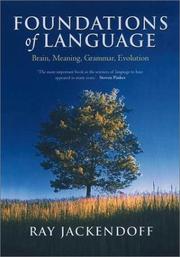
ISBN: 0198270127 0191713252 Year: 2002 Publisher: Oxford [etc.] : Oxford University Press,
Abstract | Keywords | Export | Availability | Bookmark
 Loading...
Loading...Choose an application
- Reference Manager
- EndNote
- RefWorks (Direct export to RefWorks)
Linguistics
---
Neurolinguistics
---
Psycholinguistics
---
Semantics
---
Neurolinguistique
---
Psycholinguistique
---
Sémantique
---
800
---
#BIBC:ruil
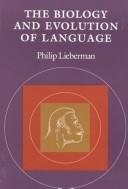
ISBN: 0674074122 Year: 1984 Publisher: Cambridge, Mass. London Harvard University Press
Abstract | Keywords | Export | Availability | Bookmark
 Loading...
Loading...Choose an application
- Reference Manager
- EndNote
- RefWorks (Direct export to RefWorks)
Psycholinguistics --- Evolution. Phylogeny --- Biolinguistics --- Biolinguistique --- Biolinguïstiek --- Evolutie --- Evolution --- Linguistique [Bio] --- Linguïstiek [Bio] --- Biological Evolution. --- Speech --- Language and languages --- -Foreign languages --- Languages --- Anthropology --- Communication --- Ethnology --- Information theory --- Meaning (Psychology) --- Philology --- Linguistics --- Philosophy --- Creation --- Emergence (Philosophy) --- Teleology --- Biology --- Evolution, Biological --- Sociobiology --- physiology. --- Origin --- -physiology. --- Biological Evolution --- Origin of languages --- physiology --- Biolinguistics. --- Language and languages - Origin. --- Evolution.
| Listing 1 - 10 of 14 | << page >> |
Sort by
|

 Search
Search Feedback
Feedback About UniCat
About UniCat  Help
Help News
News